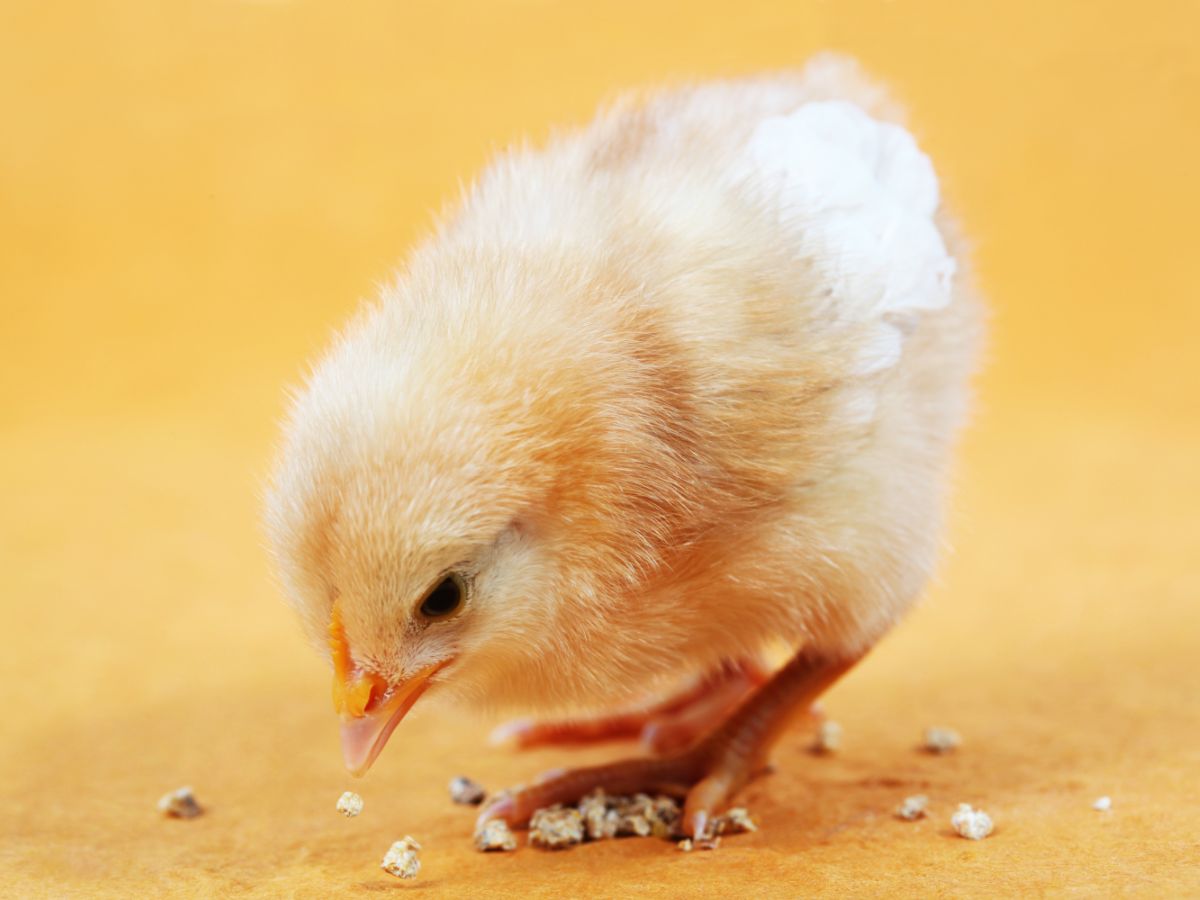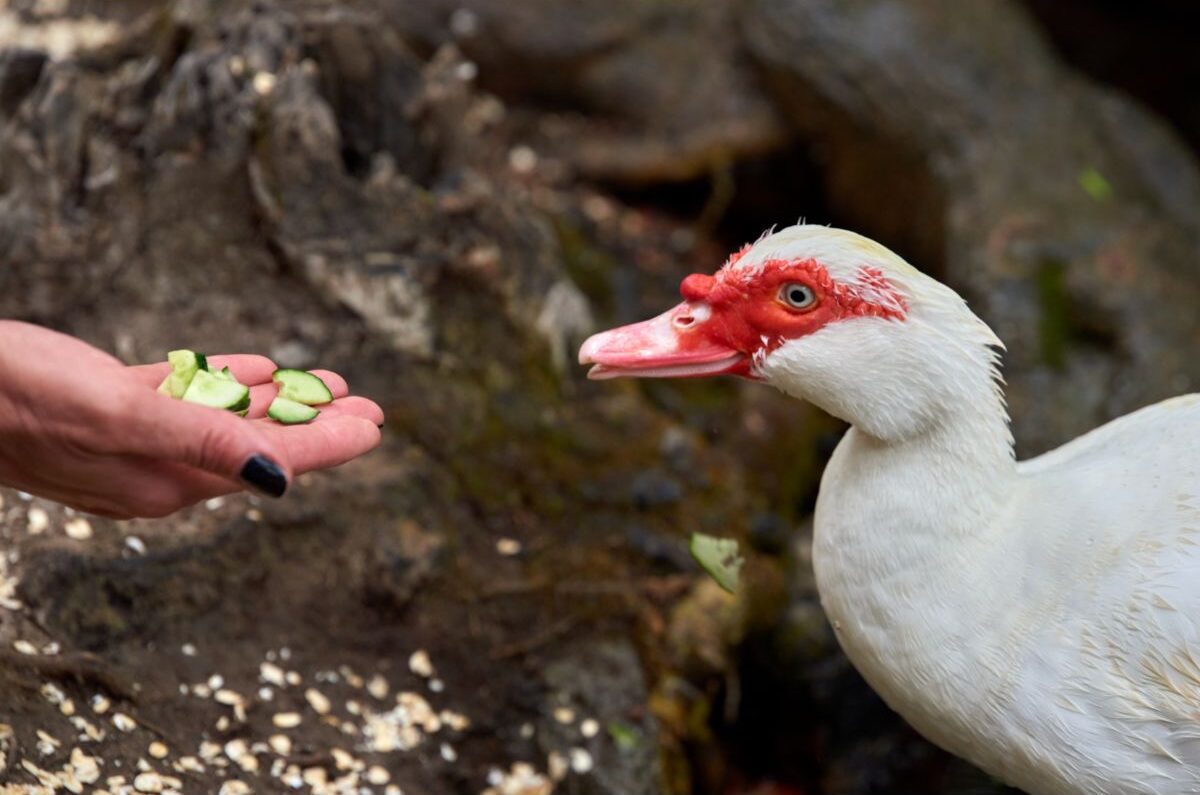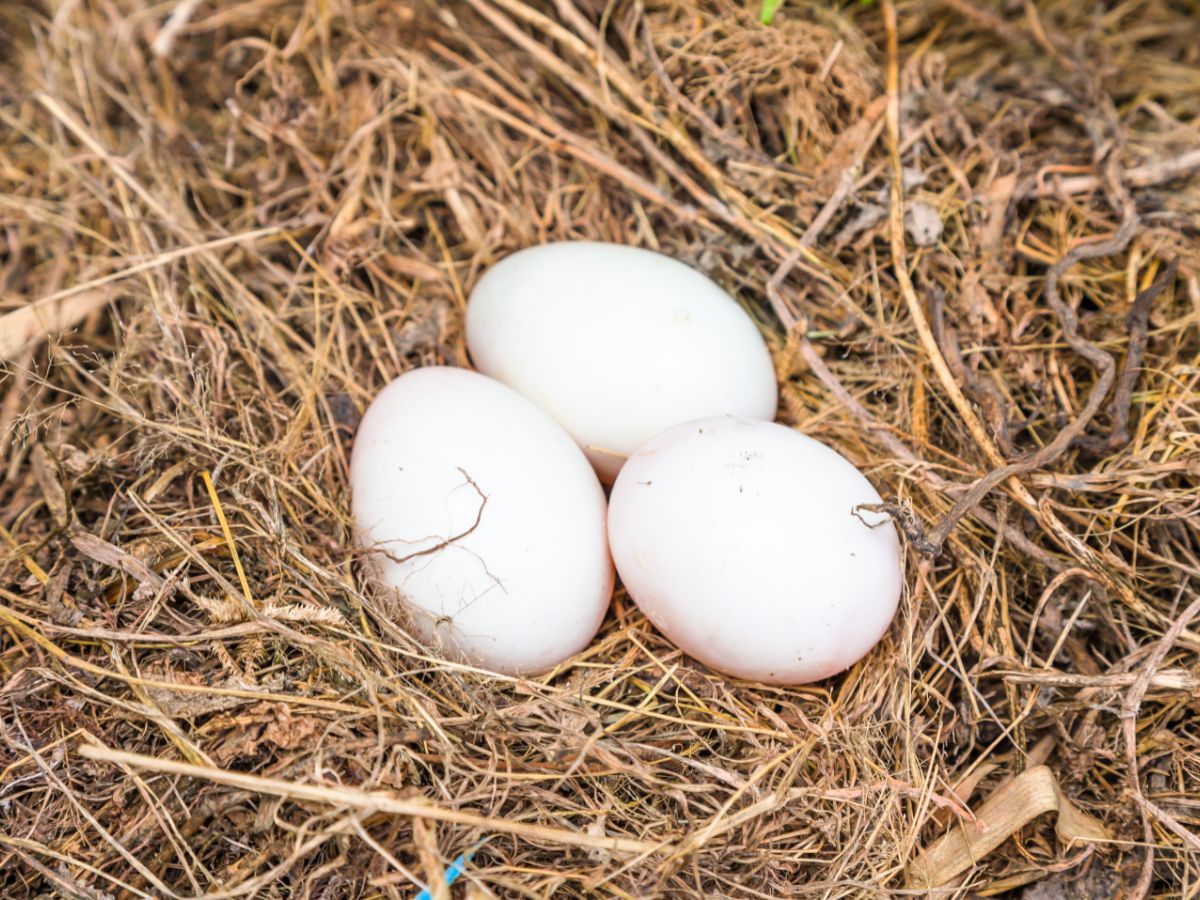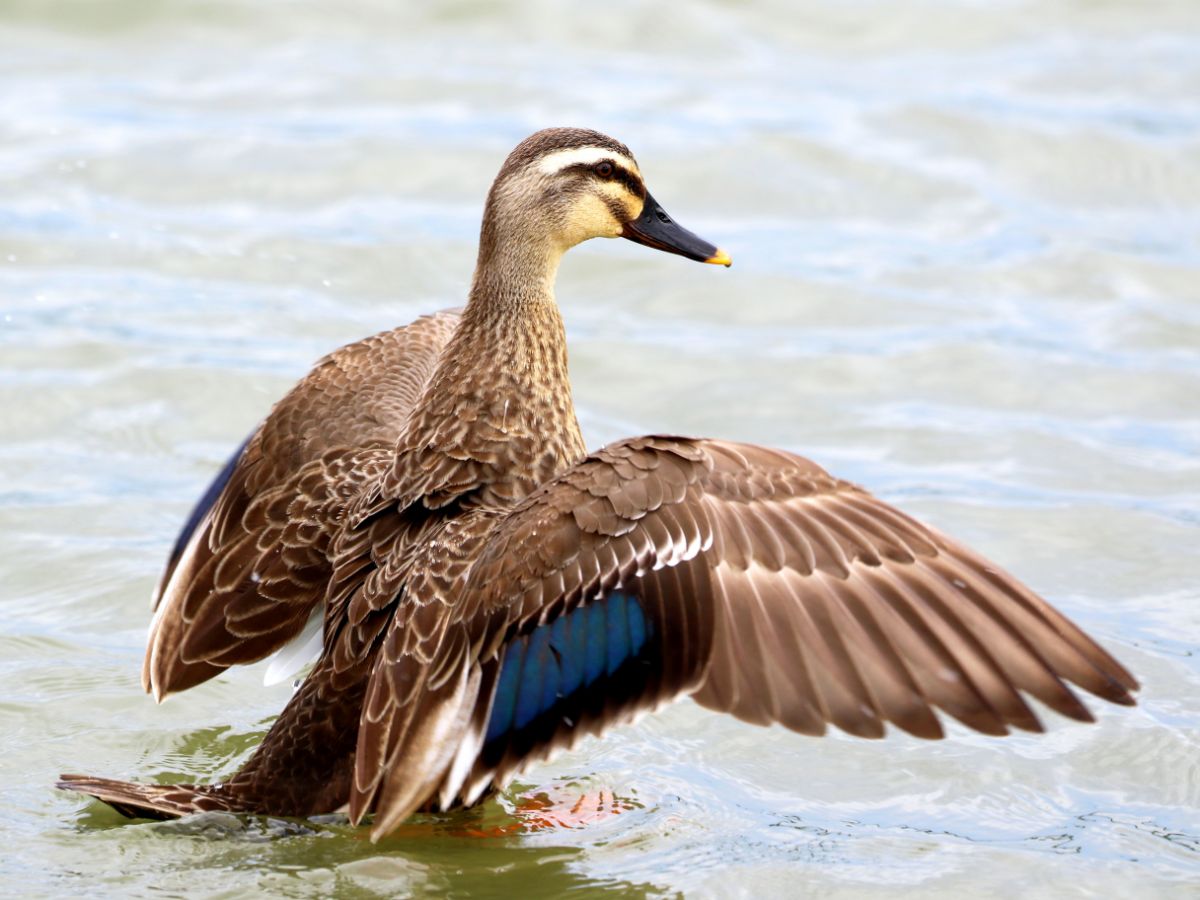If you have never raised a batch of chicks before, the process can be very intimidating, especially in terms of feeding them. Knowing what to feed, how much, and when is essential. Because chicks are so small and vulnerable, any mistakes can have fatal consequences.
Baby chicks need to be fed a complete and balanced starter feed until they are 8 weeks old. It comes in the form of a mash or crumbles that contains about 20% protein. Chicks need this to support their rapid growth. They should only be fed treats when they are a week old.
Getting chickens’ nutrition right from an early age is important for their long-term health and productivity. It helps to avoid nutrient deficiencies and developmental issues. This article explains the best food options for baby chicks to help you get it right the first time around.
Contents
What Do Baby Chicks Eat Naturally?
Mother hens instinctively know what their chicks need to eat to grow up strong and healthy. From day one, a hen leads her chicks around, teaching them how to forage. She pecks at insects, worms, and bits of vegetation on the ground, showing her babies what they should eat.
In nature, baby chicks eat many of the same things that adult chickens do. They get the protein that they need to fuel their growth from small bugs, grubs, and even little frogs and mice.
Chicks also feed on green, leafy vegetation, seeds, and grains. They eat a wide range of things to meet all their nutritional needs.
While chicks are learning to peck at the ground, they also ingest tiny bits of grit. They need grit inside their gizzard – the muscular part of their digestive system that grinds up food.
What Should You Feed Baby Chicks?
When you raise baby chicks in a brooder, you must try to replicate the chicks’ natural diet. Feeding them specially formulated chick starter feed is the easiest and most reliable way to do this.
It is designed to contain all the nutrients that growing chicks need in just the right amounts. For the first 8 weeks of a baby chick’s life, they must eat complete and balanced chick starter feed, AKA chick crumb.
Chick starter feed contains about 18 to 20% protein. This is enough to support the development of strong bones, healthy muscle mass, and feathers.
Chick feed also contains grit. Grit is an essential part of chicks’ diet because, without it, they cannot digest their food.
Medicated Vs. Unmedicated Chick Starter Feed
If you visit your local tractor supply store, you will likely find two different kinds of chick starter feed – medicated and unmedicated. Which one should you feed to baby chicks?
The medicated feed contains a chemical called Amprolium. It helps to prevent baby chicks from the disease coccidiosis. Unmedicated feed does not contain any coccidiostats.
Coccidiosis is caused by parasites in chickens’ digestive tract. It spreads via their feces, so this highly infectious disease can quickly spread to the whole flock.
If high numbers of chicks are kept in confinement, the risk of coccidiosis is high. Therefore, medicated chick feed is used in commercial chicken operations, where hundreds of baby chicks live in overcrowded cages.
For backyard chicken owners, homesteaders, and small-scale free-range chicken farms, feeding chicks medicated feed is not necessary unless when raising 50 chicks or more at a time.
If you buy day-old chicks from a breeder or hatchery, they will already have been vaccinated and, therefore, do not need medicated feed to further boost their immunity.
The Best Type Of Feed For Baby Chicks
You should always feed your baby chicks the highest quality feed your budget can afford. It really is worth it in the long run.
The best type of chick starter feed is one that is organic, non-GMO, and does not contain corn or soy fillers. Chick starter feed must contain at least 18% protein, but around 20% is ideal.
The following brands of chick starter feed are highly recommended:
- Scratch And Peck Starter Feed* contains a wholesome combination of organic, raw, wholegrain wheat, peas, barley, flaxseed meal, sesame meal, fish meal, ground limestone, and flaxseed oil. It is a fantastic brand that is widely available online, so you do not even need to drive to the feed store!
- Purina Start And Grow Chick Feed Crumbles* is another high-quality brand. It contains 18% protein and has all the vitamins, minerals, and nutrients that baby chicks need. This feed contains probiotics and prebiotics, which are great for supporting the development of chicks’ digestive systems and immune systems.
- Manna Pro Chick Starter And Grower Crumbles* is also a good option. Be sure to buy the unmedicated kind, as this brand does also make medicated feed. It contains 22% protein, and all ingredients are non-GMO. This brand does, however, contain corn and soybean meal, which is very carbohydrate-rich but not that nutritious for baby chicks.
Can You Make Homemade Chick Starter Feed?
There are some highly experienced chicken owners that make their own homemade chicks starter feed using milk, hard-boiled eggs, and oatmeal.
Going the natural, homemade route may sound better, but it is extremely risky to formulate your own chick starter feed if you do not know what exactly you are doing!
It is so easy to get the ratios wrong, and the chicks can end up with developmental issues or get sick.
To be safe, always feed chicks a commercially produced chick starter feed and supplement their diet with treats like seeds, grains, and vegetables.
Never Give Baby Chicks Adult Layer Feed!
Adult chicken feed is dangerous for baby chicks to eat because it does not contain the appropriate nutrient profile. If chicks eat adult chicken feed, it can cause very serious health problems that can be fatal.
Adult chicken feed only contains about 16% protein – not enough for rapidly growing chicks. This is only part of the issue.
Layer feed is very high in calcium to help hens produce thick, healthy eggshells. However, baby chicks cannot handle such high levels of calcium. The maximum amount of calcium allowed in chick feed is 1%.
If chicks under the age of 18 weeks regularly eat adult feed with more than 2.5% calcium, it can permanently damage their kidneys. It causes visceral gout (kidney stones) and nephrosis (kidney disease).
When you are raising baby chicks, it is best to keep them separate from the rest of the flock for the first 18 weeks. That way, you can ensure they only eat the appropriate feed.
When Should You Start Feeding Baby Chicks?
As soon as you see baby chicks hatching from their eggs, you may feel the urge to open the incubator and give them their first bit of starter feed. Do not do this!
You don’t need to be concerned about hatchlings starving before you get them into the brooder. Chicks do not need to be fed for the first 48 hours after they hatch.
Before they hatch, chicks eat the yolk inside their eggs. The yolk contains enough energy and nutrients to sustain them for two days. This allows hatcheries and breeders to ship day-old chicks without putting any feed into the box.
You should only start feeding baby chicks after they have been in the brood chamber for a day. Once you put some starter crumbles in there and gently tap the floor of the box, the chicks will quickly start pecking at the feed.
What Treats Can Baby Chicks Eat?
To better mimic the diverse diet that baby chicks would naturally eat and to provide them with some stimulation and entertainment, you can give chicks treats.
However, you must be careful about what treats you give to chicks. Their young digestive systems are still developing, and giving them the wrong type of food can easily cause stomach problems.
Appropriate treats for baby chicks are:
- Finely chopped hard-boiled eggs
- Scrambled eggs
- Finely chopped sweetcorn
- Oatmeal
- Lettuce hung from the roof of the brooder
Chicks that are older than 2 weeks can eat more decadent treats because their digestive systems are developed enough to handle the protein and fat content. You can give them:
- Dried mealworms
- Fish meal
- Small crickets
- Chopped up pumpkin
- Watermelon
- Grated cucumber
- Grated apple
- Banana
- Strawberries
- Spinach
- Cabbage
- Sprouted lentils
- Husked, chopped up sunflower seeds
- Alfalfa
- Clover

When Can You Start Giving Baby Chicks Treats?
When a mother hen raises chicks, they are introduced to treats from day one. However, you should wait a little longer when raising baby chicks in a brooder.
It is best to wait until chicks are a week old before you start giving them treats. This gives their digestive systems time to develop.
It is good for the baby chicks to focus solely on their starter mash for a week or so because they get all the vitamins, minerals, and nutrients that they need in the correct quantities.
Giving chicks treats from too early on can distract them from their starter feed. Treats do not constitute a balanced diet, so it can cause them to develop nutrient deficiencies.
Do Not Give Baby Chicks Too Many Treats!
Throughout a chicken’s life, it must never be given too many treats, but this is especially important for baby chicks.
If chicks are given too many treats, they will eat them instead of their complete and balanced starter feed. This can lead to nutritional deficiencies.
Treats should only make up 5% of a baby chick’s diet. This means that you should not give them more than a teaspoon of treats per chick every couple of days.
High protein treats like eggs, sunflower seeds, mealworms, and crickets should be fed in moderation. Chicks need protein, but too much is bad for them. Only give chicks a teaspoon of these treats per week.
Fruits like grapes and watermelon are good for chicks, but they are also high in sugar. Therefore, feed these treats to chicks in small amounts no more than twice a week.
What To Avoid Feeding To Baby Chicks
There are certain foods that baby chicks must never be fed. These are:
- Adult chicken feed – too high in calcium, not enough protein
- Long lawn clippings – these can get stuck in their crop
- Crushed oyster shells – far too high in calcium, will cause kidney damage
Baby chicks and adult chickens should never eat the following foods:
- Dried, raw, or sprouted beans – contain a toxin called phytohaemagglutinin, which can be fatal to poultry
- Moldy fruits and vegetables – certain mold strains are toxic and can cause liver cancer
- Avocado – the pits and skins contain a toxin called persin that can cause heart and respiratory issues and even death
- Green potatoes – contain a toxin called solanine that causes drowsiness, paralysis, and eventually, death
- Green tomatoes – also contain solanine
- Chocolate – contains theobromine and caffeine, both of which are toxic to chickens
- Coffee grinds – contain caffeine
When To Transition Chicks To Grower Feed
When chicks are two months old, they can start eating grower feed. It contains slightly less protein, usually around 16 to 18%, and it is specifically formulated to meet growing chicks’ nutritional needs.
To avoid upsetting chicks’ stomachs and get them used to the taste and texture, you should gradually transition them from starter to grower feed. For a week or two, give the chicks a 50/50 combination of starter and grower feed. Thereafter they can be given just grower feed.
When they are 18 weeks old, the birds can move on to eating layer feed. This will support their egg production.
Conclusion
When baby chicks are raised by a free-range mother hen, they eat a wide variety of things from day one – small bugs, grubs, worms, seeds, grains, and bits of leafy vegetation. However, chicks raised in a brooder must be fed a complete and balanced chick starter feed for the first 8 weeks. It contains all the nutrients that chicks need to develop properly.
To diversify the baby chicks’ diet, you can start giving them treats from when they are a week old. You can give them finely mashed hard-boiled eggs, cracked grains, seeds, and fruits and vegetables that have been chopped up into tiny pieces.




